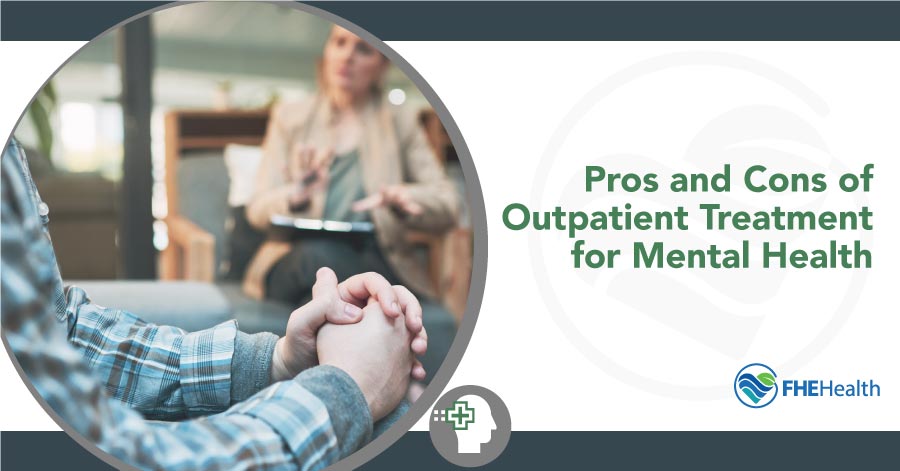
When it comes to mental health care, everyone has their preferences and needs for the type of treatment they should receive to help them navigate recovery. If you’re unsure where to start, it may be worth taking a look at the differences between outpatient and inpatient care and what they have to offer. After exploring the pros and cons of rehabilitation with an outpatient program, you can decide which option may work best for you.
Defining Inpatient and Outpatient Mental Health Care
Inpatient care is a residential rehabilitation program where individuals stay in a specialized facility that caters to their needs by offering around-the-clock care. This type of program can be beneficial for those who are struggling with mental health disorders or severe substance dependency. If someone doesn’t have a stable or supportive home environment, an inpatient program may be a safe place for them to receive the treatment they need.
In an outpatient program, individuals don’t live in a designated facility. Treatment can be administered in a variety of settings such as a hospital, community center or specialized rehab facility. Several levels of care are available, which offers individuals flexibility with structure and scheduling. This type of treatment might be best for people who don’t require 24-hour care or have a stable and supportive home environment.
The conflict you’re struggling with and the type of hands-on care you believe would be the most beneficial are some of the factors that can help you decide whether an inpatient or outpatient program would work best. Let’s explore some rehab pros and cons that an outpatient program can offer.
Pros of Outpatient Treatment
Lifestyle Flexibility
One of the benefits of outpatient care is that individuals are able to continue participating in school, work or family obligations while receiving treatment. If they live in a secure environment, they’re able to stay in the comfort of their own homes surrounded by the support of their family and close friends.
Affordability
Outpatient treatment tends to be less expensive than inpatient treatment. Pricing can vary, but for a 30-day outpatient program, individuals can expect to pay anywhere from $1,400 to $10,000 for treatment. This can be due to outpatient services being less expensive than inpatient services.
Different Levels of Care
Individuals usually have access to multiple levels of care within an outpatient program. This makes it possible for people to personalize the treatment they receive based on what level of commitment or intensity they need. If a person finds that they’re struggling, they can move to a higher level of care, whereas a person who feels they’re doing better can drop to a lower level.
Build Community
Being part of a supportive outpatient program can lead to establishing relationships that individuals can continue throughout recovery. Rather than the short-term relationships that might be formed in a residential program, people can meet others who share a community with them and expand their network in their local area.
Cons of Outpatient Treatment
Limited Supervision
Outpatient programs don’t provide 24-hour supervision, which means an individual’s behavior isn’t consistently being monitored. Some people may prefer this, but if a person is really struggling with their mental health or addiction and their behavior becomes erratic or even dangerous, outpatient treatment may not be the best course of action.
Requires Family Involvement
It’s possible that being around family might add more stress to a person’s recovery, especially if their home environment isn’t very stable or supportive. Trying to keep up with everyday responsibilities such as work, school, or taking care of children and other family members could also interfere with treatment and make it hard to keep up with everything.
Exposure to Bad Influences
There’s a much higher risk of individuals being exposed to bad influences that can cause their mental health to worsen. With access to drugs and alcohol, people may turn to one of these methods rather than a healthier option if they don’t have a support system at home.
Less Resources
Outpatient programs don’t offer as much access to therapists or counselors as inpatient programs do. If a person is having a bad day, they most likely will have to wait until their next scheduled appointment to seek out help or advice. This can require an individual to establish their own methods of help at home, which doesn’t work for everyone.
Determining Which Option Is Best for You Based on the Pros and Cons of Rehabilitation
Understanding these pros and cons is the best way to figure out if outpatient treatment is the right option for you. It largely depends on what stage of recovery you’re in and how much supervision and care you feel is needed. If you think it’s possible to continue balancing your home life and everyday responsibilities while getting the help you need, an outpatient program may be a good option. Being around a strong support system in the comfort of your home can be beneficial to a successful recovery.
If taking a step back from everyday life is more appealing, it may be necessary to seek care in a residential facility. Staying in an environment that doesn’t feel secure or doesn’t offer the resources and care you need won’t be helpful and could make recovery harder to achieve.
It’s helpful to explore the pros and cons of rehabilitation in both an inpatient and outpatient treatment program to discover which elements matter to you the most.
Seek Some Level of Care for a Better Life
If you or a loved one is struggling with a mental health disorder, seeking care at any level is the first step to building a better life. At FHE Health, we know how hard it is to take that first step toward recovery, which is why we’re here to help.
For more information, contact us to speak with one of our trained counselors. By calling us at (833) 596-3502, you can begin your journey to recovery today.






